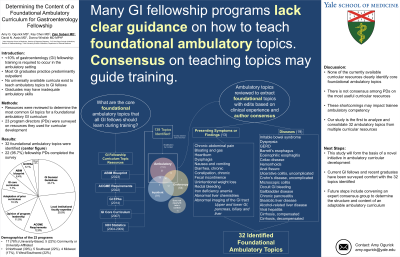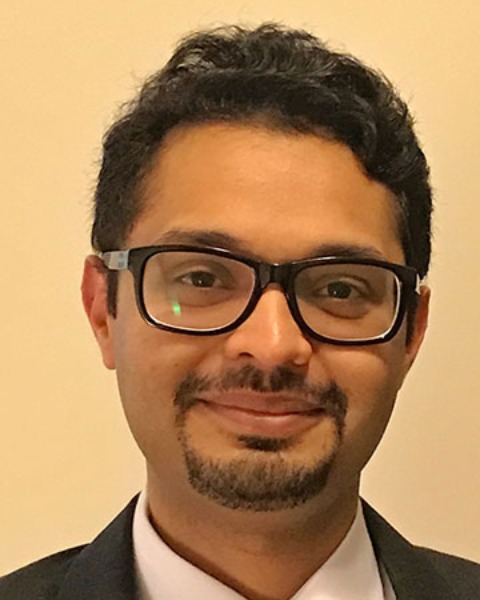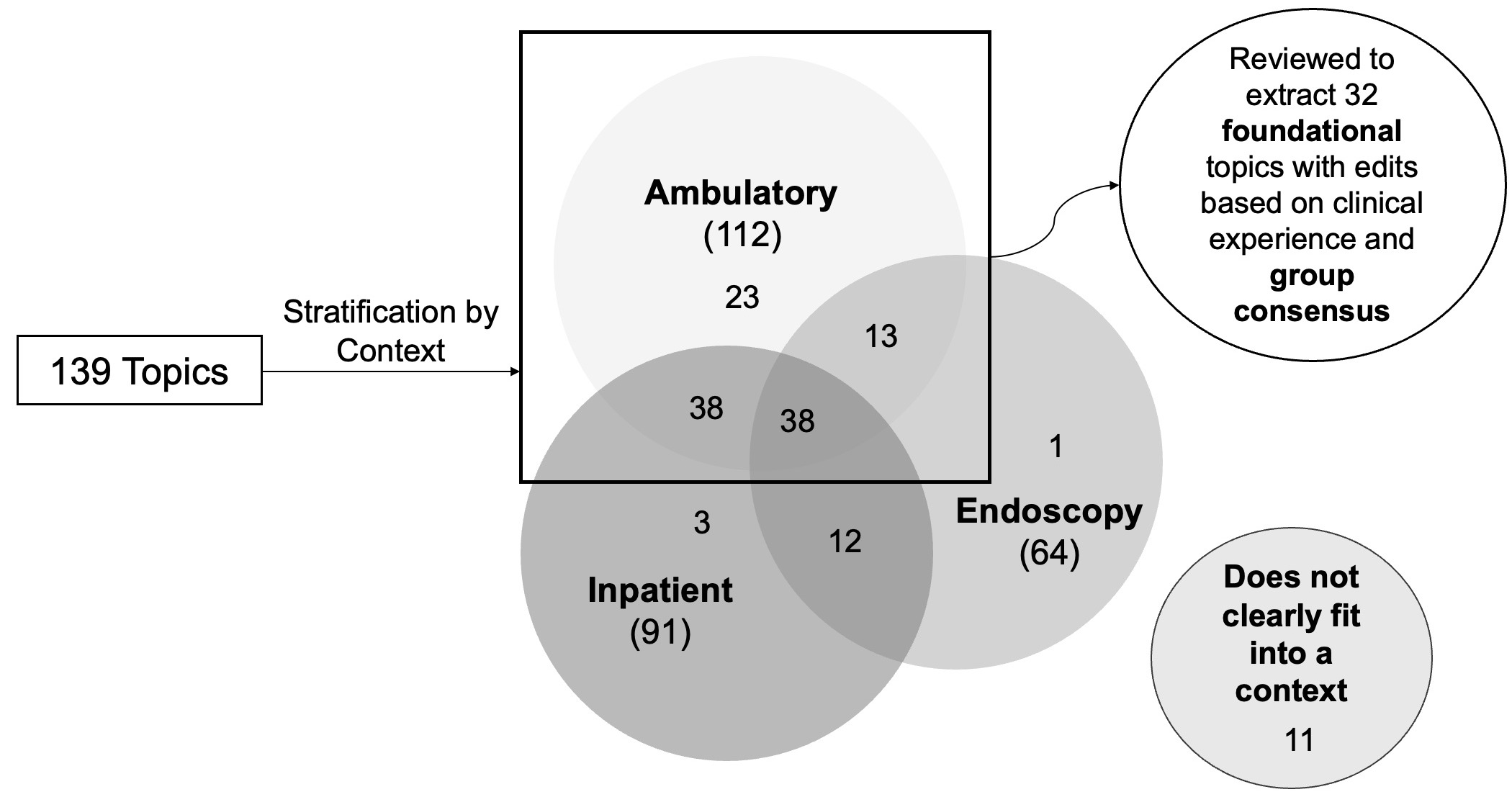Tuesday Poster Session
Category: Practice Management
P4921 - Determining the Content of a Foundational Ambulatory Curriculum for Gastroenterology Fellowship
Tuesday, October 29, 2024
10:30 AM - 4:00 PM ET
Location: Exhibit Hall E

Has Audio

Zain Sobani, MBBS
Resident
Maimonides Medical Center, WV
Presenting Author(s)
Amy G. Ogurick, MD1, Kay Chen, MD2, Zain A.. Sobani, MD1, David N.. Assis, MD1, Donna Windish, MD, MPH1
1Yale University School of Medicine, New Haven, CT; 2University of San Diego, La Jolla, CA
Introduction: Although less than 10% of gastroenterology (GI) fellowship training is required to occur in the ambulatory setting, most GI graduates predominantly practice in this setting. This discrepancy between training and practice risks producing graduates with inadequate ambulatory skills. Other disciplines have modalities to teach foundational ambulatory topics, but nothing universally available exists for GI.
Methods: Available resources were reviewed to determine the most common GI topics for a foundational ambulatory GI curriculum. The 5 selected resources reviewed were the American Board of Internal Medicine Gastroenterology Blueprint, Accreditation Council for Graduate Medical Education program requirements, Gastroenterology Entrustable Professional Activities, the Gastroenterology Core Curriculum, and National Institute of Health Statistics on the most common ambulatory GI disorders. Next, a survey of 23 fellowship program directors (PD) across the US was conducted on resources they used for curricular development by choosing from a list of commonly used guidelines/curricula.
Results: 139 unique topics were identified and stratified by clinical context (Figure 1). Among 112 ambulatory topics, 32 foundational topics were identified based on consensus of study authors and stratified by symptoms/findings and disease s (Table). 21 (91%) fellowship PDs completed the survey and selected among multiple resources which they found most useful in developing their fellowships’ curricula: GI societal guidelines (22.7%), local institutional faculty expertise (20.0%), Accreditation Council for Graduate Medical Education requirements (13.3%), opinion of program leadership (10.7%), adaptation of prior curriculum (10.7%), GI core curriculum (8.0%), American Board of Internal Medicine blueprint (6.7%), GI Entrustable Professional Activities (5.3%) and others (2.7%).
Discussion: While many available resources are used by GI fellowship programs to develop curricula, none clearly identify foundational ambulatory topics. Furthermore, there is no consensus among surveyed PDs on the most useful resources for curricular design. These shortcomings may impact trainee ambulatory competency. Our study is the first to analyze and consolidate 32 ambulatory topics from multiple curricular resources and will form the basis of a novel initiative in ambulatory curricular development. This initiative will include a survey of current fellows and recent graduates to assess their confidence level with these topics, and a consensus group of expert faculty to develop a new curriculum focused on ambulatory GI.

Note: The table for this abstract can be viewed in the ePoster Gallery section of the ACG 2024 ePoster Site or in The American Journal of Gastroenterology's abstract supplement issue, both of which will be available starting October 27, 2024.
Disclosures:
Amy G. Ogurick, MD1,Kay Chen, MD2, Zain A.. Sobani, MD1, David N.. Assis, MD1, Donna Windish, MD, MPH1. P4921 - Determining the Content of a Foundational Ambulatory Curriculum for Gastroenterology Fellowship, ACG 2024 Annual Scientific Meeting Abstracts. Philadelphia, PA: American College of Gastroenterology.
1Yale University School of Medicine, New Haven, CT; 2University of San Diego, La Jolla, CA
Introduction: Although less than 10% of gastroenterology (GI) fellowship training is required to occur in the ambulatory setting, most GI graduates predominantly practice in this setting. This discrepancy between training and practice risks producing graduates with inadequate ambulatory skills. Other disciplines have modalities to teach foundational ambulatory topics, but nothing universally available exists for GI.
Methods: Available resources were reviewed to determine the most common GI topics for a foundational ambulatory GI curriculum. The 5 selected resources reviewed were the American Board of Internal Medicine Gastroenterology Blueprint, Accreditation Council for Graduate Medical Education program requirements, Gastroenterology Entrustable Professional Activities, the Gastroenterology Core Curriculum, and National Institute of Health Statistics on the most common ambulatory GI disorders. Next, a survey of 23 fellowship program directors (PD) across the US was conducted on resources they used for curricular development by choosing from a list of commonly used guidelines/curricula.
Results: 139 unique topics were identified and stratified by clinical context (Figure 1). Among 112 ambulatory topics, 32 foundational topics were identified based on consensus of study authors and stratified by symptoms/findings and disease s (Table). 21 (91%) fellowship PDs completed the survey and selected among multiple resources which they found most useful in developing their fellowships’ curricula: GI societal guidelines (22.7%), local institutional faculty expertise (20.0%), Accreditation Council for Graduate Medical Education requirements (13.3%), opinion of program leadership (10.7%), adaptation of prior curriculum (10.7%), GI core curriculum (8.0%), American Board of Internal Medicine blueprint (6.7%), GI Entrustable Professional Activities (5.3%) and others (2.7%).
Discussion: While many available resources are used by GI fellowship programs to develop curricula, none clearly identify foundational ambulatory topics. Furthermore, there is no consensus among surveyed PDs on the most useful resources for curricular design. These shortcomings may impact trainee ambulatory competency. Our study is the first to analyze and consolidate 32 ambulatory topics from multiple curricular resources and will form the basis of a novel initiative in ambulatory curricular development. This initiative will include a survey of current fellows and recent graduates to assess their confidence level with these topics, and a consensus group of expert faculty to develop a new curriculum focused on ambulatory GI.

Figure: Five resources, American Board of Internal Medicine (ABIM) Gastroenterology Blueprint, Accreditation Council for Graduate Medical Education (ACGME) program requirements, Gastroenterology Entustable Professional Activities (EPAs), the Gastroenterology Core Curriculum and National Institute of Health Statistics on the most common GI conditions seen in the ambulatory setting, were reviewed and 139 unique topics were identified and stratified to determine foundational ambulatory topics.
Note: The table for this abstract can be viewed in the ePoster Gallery section of the ACG 2024 ePoster Site or in The American Journal of Gastroenterology's abstract supplement issue, both of which will be available starting October 27, 2024.
Disclosures:
Amy Ogurick indicated no relevant financial relationships.
Kay Chen indicated no relevant financial relationships.
Zain Sobani indicated no relevant financial relationships.
David Assis indicated no relevant financial relationships.
Donna Windish indicated no relevant financial relationships.
Amy G. Ogurick, MD1,Kay Chen, MD2, Zain A.. Sobani, MD1, David N.. Assis, MD1, Donna Windish, MD, MPH1. P4921 - Determining the Content of a Foundational Ambulatory Curriculum for Gastroenterology Fellowship, ACG 2024 Annual Scientific Meeting Abstracts. Philadelphia, PA: American College of Gastroenterology.
